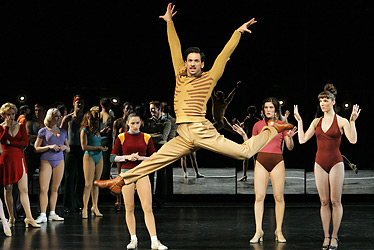In today’s Wall Street Journal drama column I review two New York musicals, Passing Strange on Broadway and Adding Machine off Broadway, plus the last of the six shows I recently saw in California, Wishful Drinking. Here’s a sample.
* * *
 Stew, a 46-year-old singer-songwriter from California with no stage experience, has brought a semi-autobiographical show to Broadway that bears no resemblance to your standard-issue faux-pop musical. In fact, “Passing Strange,” which comes to Broadway from the Berkeley Repertory Theatre by way of New York’s Public Theater, is less like a book show than a rock concert with interpolated skits, and it’s so rough-hewn in spots as to border on the naïve. It’s also the freshest musical in town, in part because Stew (whose real-life name is Mark Stewart) and his songwriting collaborator, Heidi Rodewald, are either ignorant of the conventions of musical comedy or don’t care about them. Most likely they’re more knowing than they let on, but it doesn’t matter: “Passing Strange” is the most original Broadway musical since “The Light in the Piazza,” and my guess is that it is headed for a long, profitable and influential run.
Stew, a 46-year-old singer-songwriter from California with no stage experience, has brought a semi-autobiographical show to Broadway that bears no resemblance to your standard-issue faux-pop musical. In fact, “Passing Strange,” which comes to Broadway from the Berkeley Repertory Theatre by way of New York’s Public Theater, is less like a book show than a rock concert with interpolated skits, and it’s so rough-hewn in spots as to border on the naïve. It’s also the freshest musical in town, in part because Stew (whose real-life name is Mark Stewart) and his songwriting collaborator, Heidi Rodewald, are either ignorant of the conventions of musical comedy or don’t care about them. Most likely they’re more knowing than they let on, but it doesn’t matter: “Passing Strange” is the most original Broadway musical since “The Light in the Piazza,” and my guess is that it is headed for a long, profitable and influential run.
The best thing about “Passing Strange” is the book, which shows us a side of black life in America that rarely gets talked about, much less sung about. The show’s nameless hero (well played by Daniel Breaker) is a PBS-watching, guitar-strumming Los Angeles kid who knows nothing of street life and prefers punk rock to soul. Longing to escape the philistinism of his suburban life, he hops a plane to Europe, flings himself into the bohemian scene, and becomes a performance artist who plays the race card in order to wow his leftist friends (“Yeah, Mr. May 68: do you know what it’s like to be the object of oppression living under police occupation in the ghetto?”). Not only does Stew skewer his youthful artiness with a self-mockery that makes the just-be-yourself-man earnestness of the last scene easier to stomach, but he is forthright about the pressure that the black community brings to bear on middle-class blacks who refuse to conform to its own racial clichés…
The only thing that “Adding Machine” has in common with “Passing Strange” is that it isn’t a conventional musical. This Chicago-to-Off-Broadway transfer, adapted by Jason Loewith and Joshua Schmidt from the 1923 play, takes Elmer Rice’s once-iconic, now-forgotten story of a beaten-down bookkeeper who hates his wife and murders his boss and turns it into a one-act techno-minimalist opera of near-arrogant sophistication. Would that Mr. Schmidt’s score were as memorable as it is slick, but the small-scale production, directed with awesome self-assurance by David Cromer, is so effective that you almost forget how forgettable the music is….
Addiction, mental illness, movie-star parents, bad marriages, really bad hair…Carrie Fisher, right? You got it: Princess Leia has recycled her nightmarish life yet again, this time putting it onstage in the form of an exceedingly clever one-woman show called “Wishful Drinking.” Berkeley Rep, which brought “Passing Strange” into the world a year and a half ago, is now giving the hapless daughter of Debbie Reynolds and Eddie Fisher an opportunity to be drop-dead funny about a string of personal crises so horrific that the only alternative to laughing at them is slashing your wrists in sympathy…
* * *
Read the whole thing here.
Archives for February 2008
TT: Almanac
“In America, the race goes to the loud, the solemn, the hustler. If you think you’re a great writer, you must say that you are.”
Gore Vidal, interview, Writers at Work, Fifth Series
CAAF: Here’s the church, and here’s the steeple

This is White Rock Hall, née White Rock Church, built in 1909 and located in Madison County, about an hour north of Asheville. It belongs to our friends Keith Flynn and Denise Petry. Keith is a poet, author, musician, and the editor of the Asheville Poetry Review, and the church is the first piece of a small arts retreat and conference center he and Denise are putting together. When the campus is complete, there’ll be class spaces, a recording studio, and cottages for overnight stays.
On Saturday, Lowell and I were invited to watch the church get moved from its original spot, at a crossroads, to its new home on a nearby hillside, where it will preside over some beautiful rolling acreage. The morning was cold and gray with a steady drizzle, and the operation got halted a couple times due to wet conditions and an aggressive tree incursion. A couple officers from the Madison County Sheriff’s Department were on hand to control (the nonexistent) traffic and, Keith said, to shoot the moving crew’s foreman “if he drops my church.”
The church had been shut up for a number of years before it went up for sale (it has no power or electricity, and there’s a bigger brick church down the street); a neighbor who was watching the move, a Mr. Hensley in a green John Deere cap, told me he’d last been inside for a funeral in 1966. But the building is still lovely in its bones, with what Denise calls its witch’s hat on top and a bell that clanged once — loudly — as the church got hoisted from its original spot.
Photo: “White Rock Hall Arrives” by Lowell Allen. If you squint you can see a lone figure standing on the hillside behind the church holding a beige umbrella. That’s me! Catching a cold! More photos here.
TT: So you want to see a show?
Here’s my list of recommended Broadway, off-Broadway, and out-of-town shows, updated weekly. In all cases, I gave these shows favorable reviews in The Wall Street Journal when they opened. For more information, click on the title.
Warning: Broadway shows marked with an asterisk were sold out, or nearly so, last week.
BROADWAY:
• Alfred Hitchcock’s The 39 Steps * (comedy, G, suitable for bright children, closes Mar. 23, reviewed here)
• August: Osage County (drama, R, adult subject matter, closes Apr. 20 and reopens Apr. 29 at the Music Box Theatre for an open-ended run, reviewed here)
• Avenue Q * (musical, R, adult subject matter and one show-stopping scene of puppet-on-puppet sex, reviewed here)
 • A Chorus Line (musical, PG-13/R, adult subject matter, reviewed here)
• A Chorus Line (musical, PG-13/R, adult subject matter, reviewed here)
• Grease * (musical, PG-13, some sexual content, reviewed here)
• The Homecoming (drama, R, adult subject matter, closes Apr. 13, reviewed here)
• The Little Mermaid * (musical, G, entirely suitable for children, reviewed here)
• November (comedy, PG-13, profusely spattered with obscene language, here)
• The Seafarer (drama, PG-13, adult subject matter, closes Mar. 30, reviewed here)
• Sunday in the Park with George (musical, PG-13, extended through June 16, reviewed here)
IN LOS ANGELES:
 • Victory (drama, PG-13, adult subject matter, closes Mar. 23, reviewed here)
• Victory (drama, PG-13, adult subject matter, closes Mar. 23, reviewed here)
ON TOUR:
• Moby-Dick–Rehearsed (drama, G, not suitable for children, touring the U.S. through May 17, reviewed here)
CLOSING SOON ON BROADWAY:
• Come Back, Little Sheba (drama, PG-13, adult subject matter, closes Mar. 16, reviewed here)
CLOSING NEXT WEEK ON BROADWAY:
• Is He Dead? (farce, G, reasonably family-friendly, closes Mar. 9, reviewed here)
• Rock ‘n’ Roll (drama, PG-13, way too complicated for kids, closes Mar. 9, reviewed here)
CLOSING NEXT WEEK IN SAN FRANCISCO:
• Blood Knot (drama, PG-13, closes Mar. 9, reviewed here)
CLOSING THIS WEEKEND IN NEW YORK:
• The Farnsworth Invention (drama, PG-13, closes Sunday, reviewed here)
• Hunting and Gathering (comedy, PG-13, adult subject matter, closes Saturday, reviewed here)
TT: Almanac
“One always dies too soon–or too late. And yet, life is there, finished: the line is drawn, and it must all be added up. You are nothing other than your life.”
Jean-Paul Sartre, No Exit
TT: William F. Buckley, Jr., R.I.P.
 Bill Buckley died this morning. In public life he was a witty, devastatingly effective spokesman for conservatism and the founder of National Review, one of the most influential political magazines of the twentieth century. In private life he was considerate beyond compare, a charismatic host with a magical gift for putting his guests at ease and a passionate amateur pianist who played Bach with fair skill and much love.
Bill Buckley died this morning. In public life he was a witty, devastatingly effective spokesman for conservatism and the founder of National Review, one of the most influential political magazines of the twentieth century. In private life he was considerate beyond compare, a charismatic host with a magical gift for putting his guests at ease and a passionate amateur pianist who played Bach with fair skill and much love.
I had known him since 1981, when he published the first magazine piece I ever wrote, a review of a book about A.J. Liebling. A year later he wrote a syndicated column about another piece of mine, at a time in my life when I was still trying to find myself as a writer, and my path was smoothed by his generous words. On countless other occasions he helped me in ways I knew I would never be able to repay, though I made a token effort by dedicating my Mencken biography to him.
Pat, Bill’s wife, died last April. They had been the closest of companions, and no one who knew him at all well expected him to survive her for long. Nor did he: Bill outlived Pat by less than a year. Now the obituarists will write of his place in the history of postwar American political thought, and they will have much to tell, for he was a very important man and an exceedingly good writer. At some point I will sit down and reread Cruising Speed: A Documentary, my favorite of his five dozen books and the one that best conveys his personality. But not yet: right now I want to think of him not as the great public figure he was but as the charming, funny man who once upon a time was unstintingly kind to an unknown young writer.
I thought the world of him, and I cannot imagine the world without him.
UPDATE: Bill was the friend (though not the pianist) to whom I referred in a posting from 2006:
I’m writing these words immediately after having returned from a private concert held in the art-laden living room of a friend of mine who owns a wonderful old Bösendorfer grand. The performer was a serious amateur pianist who played two Beethoven sonatas, Opp. 109 and 111 (frivolous amateurs don’t play late Beethoven). I sat close enough to the keyboard to read the music over his shoulder. The audience consisted of twenty people, most of whom knew one another more or less well, and after Op. 111 we retired to the host’s dining room for a sit-down meal. That’s the way to hear classical music.
It sure was.
OGIC: The dog is dead
If you check out the Top Fives this week you’ll see that I’ve added an item specifically for Chicagoans or, I suppose, greater Midwesterners with weekend wanderlust. The item in question is a play that just opened at Strawdog Theatre here in town, where Terry and I so enjoyed Brian Friel’s Aristocrats last autumn. Now Strawdog, which is in the midst of its 20th anniversary season, is offering Richard III with the company’s Artistic Director, Nic Dimond, directing. It’s another winner.
I’m a sucker for a good villain. Even more so, I’m a sucker for casting villains against type. It’s not easy to pull off, but when successful creates a frisson like no other. Strawdog’s John Henry Roberts, who plays the title role here, struck me as just such a case–his open features and essentially empathetic demeanor assert themselves even through Richard’s blackest lines. And Roberts makes this work. He made me feel that I too would have been taken in. It makes the evil more insidious, the sting of its revelation in someone likable and trusted more devastating.
Strawdog’s performance space is challengingly small but seems to bring out the ingenuity of set designers and directors alike. For this production, however, that ingenuity seemed more directed at emphasizing the closeness of the space than overcoming it. Before any lines are spoken, an opening party scene crowds seemingly every actor in the production into this space, nearly bursting its seams. This establishes a creeping sense of claustrophobia that meshes well this Richard’s particularly insidious brand of malignancy.
In addition to Roberts’s performance, Strawdog ensemble member Jennifer Avery’s turn as Queen Elizabeth has to be singled out. In the earlier scenes, when she’s not yet widowed–and worse–she’s a perfect blithe Renaissance Heather. Later, she brings a quiet, heartbreaking conviction to Elizabeth’s sorrow and her last line of defense against Richard’s designs on her daughter. Nothing flashy here–just a thoroughly convincing and moving habitation of her character and flawless execution. Here and in Aristocrats, Avery did wonders with characters who start out hard and gradually are humanized. Whatever she does next, I hope to be there.
TT: Incommunicado
You probably won’t hear much from me this week or next. On Saturday The Letter begins five consecutive days of workshop rehearsals in Manhattan, which will soak up whatever spare time I have left over from the pieces I have to write, the lecture I have to give, and the opera I’m about to see (Mrs. T and I are going to the opening of the Metropolitan Opera’s new production of Benjamin Britten’s Peter Grimes, directed by John Doyle, tomorrow night). Needless to say, Rhythm Man: A Life of Louis Armstrong is still hanging over my head as well.
Blogging? I’ll try. Really. I swear.
